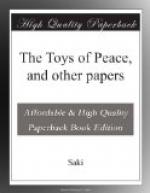“I didn’t come about hats,” said her visitor. “In fact, I don’t think I really came about anything. I was passing and I just thought I’d look in and see you. Since I’ve been sitting talking to you, however, rather important idea has occurred to me. If you’ll forget Goodwood for a moment and listen to me, I’ll tell you what it is.”
Some forty minutes later James Cushat-Prinkly returned to the bosom of his family, bearing an important piece of news.
“I’m engaged to be married,” he announced.
A rapturous outbreak of congratulation and self-applause broke out.
“Ah, we knew! We saw it coming! We foretold it weeks ago!”
“I’ll bet you didn’t,” said Cushat-Prinkly. “If any one had told me at lunch-time to-day that I was going to ask Rhoda Ellam to marry me and that she was going to accept me I would have laughed at the idea.”
The romantic suddenness of the affair in some measure compensated James’s women-folk for the ruthless negation of all their patient effort and skilled diplomacy. It was rather trying to have to deflect their enthusiasm at a moment’s notice from Joan Sebastable to Rhoda Ellam; but, after all, it was James’s wife who was in question, and his tastes had some claim to be considered.
On a September afternoon of the same year, after the honeymoon in Minorca had ended, Cushat-Prinkly came into the drawing-room of his new house in Granchester Square. Rhoda was seated at a low table, behind a service of dainty porcelain and gleaming silver. There was a pleasant tinkling note in her voice as she handed him a cup.
“You like it weaker than that, don’t you? Shall I put some more hot water to it? No?”
THE DISAPPEARANCE OF CRISPINA UMBERLEIGH
In a first-class carriage of a train speeding Balkanward across the flat, green Hungarian plain two Britons sat in friendly, fitful converse. They had first foregathered in the cold grey dawn at the frontier line, where the presiding eagle takes on an extra head and Teuton lands pass from Hohenzollern to Habsburg keeping—and where a probing official beak requires to delve in polite and perhaps perfunctory, but always tiresome, manner into the baggage of sleep-hungry passengers. After a day’s break of their journey at Vienna the travellers had again foregathered at the trainside and paid one another the compliment of settling instinctively into the same carriage. The elder of the two had the appearance and manner of a diplomat; in point of fact he was the well-connected foster-brother of a wine business. The other was certainly a journalist. Neither man was talkative and each was grateful to the other for not being talkative. That is why from time to time they talked.
One topic of conversation naturally thrust itself forward in front of all others. In Vienna the previous day they had learned of the mysterious vanishing of a world-famous picture from the walls of the Louvre.




